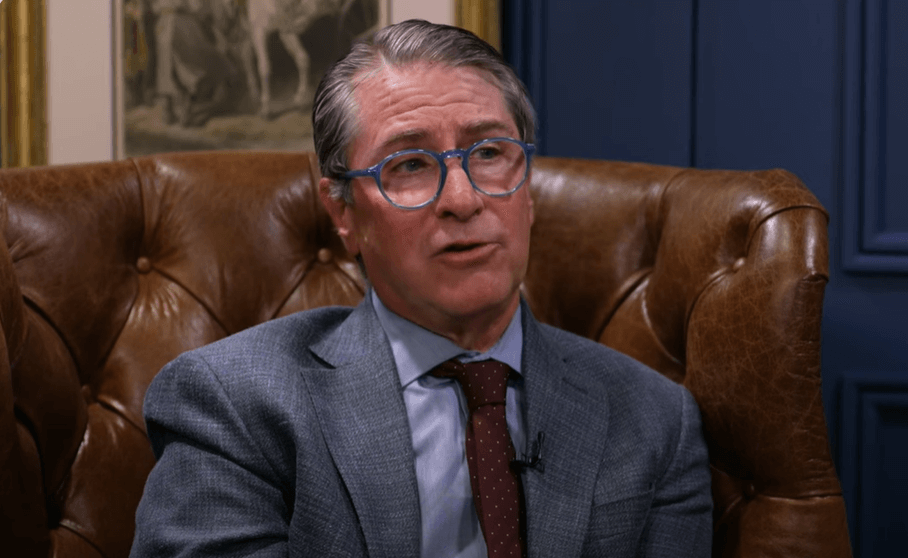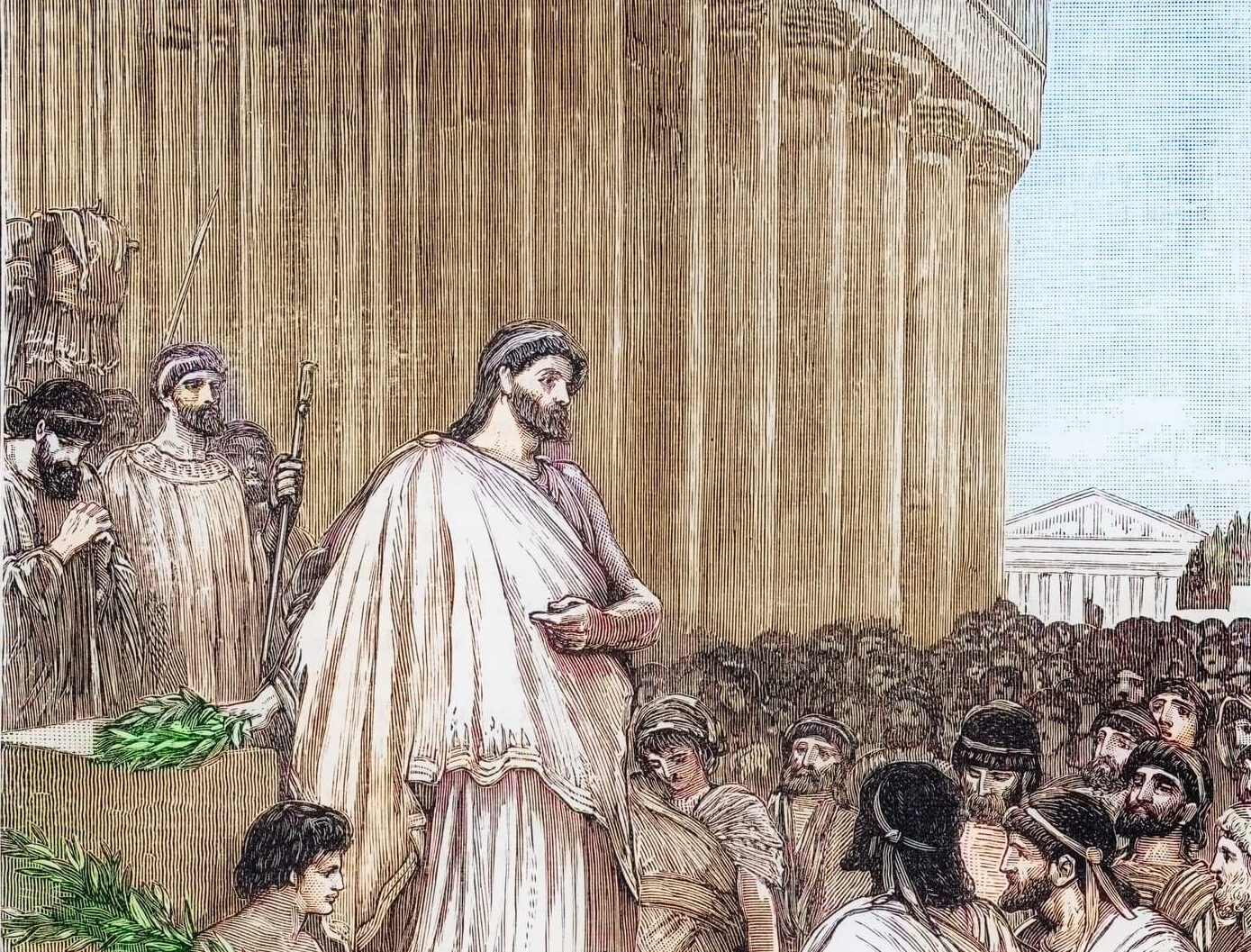Resurrecting the Idea of a Christian Society
By R. R. Reno
(Washington, DC: Regnery Faith, 2016)
The idea of a Christian society is—and has always been—somewhat difficult to define. It is not so much that it is difficult to describe what Christianity or civil society is. Rather, it is difficult to grasp exactly how the two things cohere, to identify what makes a particular society Christian or how Christianity can influence civil society in a deep and abiding way. The easy and usual response to this problem is to invoke reflexively Augustine’s account of the two cities: the city of God and the earthly city. But this response finally misses the mark. After all, Augustine’s main point is not to show how these two cities intermingle and mutually reinforce one another, but to distinguish between two distinct kinds of communities—one ordered around Christians’ transcendent and transpolitical end in God, and the other around the unmistakably terrestrial operations and ends of political life in a fallen world. The idea of a Christian society alludes to something different. It points to a single temporal reality, one in which Christianity and civil society have somehow managed to meet and work out a viable coexistence with each another. Neither simply Christian nor simply a civil society, a Christian society is the real-world offspring of the historical coming together of two different and differing kinds of complex communities. As such, it represents a genuinely remarkable (if always fragile) theological and political human achievement.
Part brief, part apologia, and part ruminative meditation, R. R. Reno’s Resurrecting the Idea of a Christian Society goes right to the heart of what it means to think of America as a Christian society. Reno, a former theology professor at Creighton University and now editor of First Things, takes the title of his slim volume from T. S. Eliot’s famous 1939 essay “The Idea of a Christian Society.” Eliot wrote that essay at the very moment when the democratic West was being externally threatened by National Socialism and communist totalitarianism. Reno’s target obviously lies elsewhere. Taking aim at America’s increasingly “nonjudgmental” culture of techno-progress and economic liberalism, Reno makes the case for restoring in America the kind of “genuine freedom” that “encourages human flourishing to the degree that the supernatural authority of God’s revelation is proclaimed and the natural authority of his creation is sustained.”
Resurrecting the Idea of a Christian Society offers us more than simply a theological and political tract on the abstract idea of a Christian society. It dares to address a distinct historical civil society, one with a particular name and a particular people and a particular ethos. Reno’s intellectual approach is refreshing. It neither sacrifices politics and culture on the altar of theological reflection, nor does it allow politics and culture to eclipse properly theological concerns (though, at times, Reno does seem to view theological concerns too much through the lens of cultural and political analysis, thus running the risk of placing the theological cart before the political horse). This engaged and engagingly written book is a work of genuine “public theology,” a form of thoughtful practical reflection that once flourished in America but is now far rarer—and far more difficult to pull off—than we commonly believe.
Reno’s argument is not just that America was founded as a “Christian society” but that America’s actually being a “Christian society” is vital to its practical health and well-being. In Reno’s view, this fact should be clearer than ever. Contemporary America, in his telling, visibly suffers from a debilitating moral and cultural crisis. And while the demographic fault lines of this crisis may look familiar to most observers, in Reno’s hands they are given new emphasis and substantial spiritual depth.
Like the Republican “winner” and the Democratic “loser” of the 2016 presidential election, Reno also identifies a deep and growing societal divide between those who are economically and culturally successful in present-day America and those who are not—the two groups barely held together by a dwindling and beleaguered middle class. But whereas Donald Trump and Hillary Clinton (and Bernie Sanders, for that matter) rhetorically focused on the perceived economic roots of this growing divide, Reno focuses on its spiritual origins and effects. “We’re facing a crisis of solidarity, not freedom, and this crisis of solidarity foretells a crisis of freedom. Atomized, isolated individuals adrift in a deregulated moral culture are easily dominated, whether by political manipulators or the directionless leadership of mass culture.” America has become, as Reno sees it, a dangerously fragmented and increasingly polarized society. Over the past several decades, increased governmental regulation and a gospel of self-proclaimed, high-minded libertarianism have conspired to allow a comparatively small yet growing number of financially and culturally successful Americans to assuage their consciences by holding fast to a neopuritanical creed that preaches the imperatives of merit, nonjudgmentalism, inclusion, and diversity. The results, for Reno, have been devastating: “No social crisis of our time is more profound than this disregard—to the point of disdain—for the moral needs of the vulnerable.”
Reno convincingly highlights the deleterious consequences of the libertarian abstraction shared by an influential part of the left and an equally influential part of the right. Leaning heavily on the analysis of Charles Murray’s Coming Apart: The State of White America, 1960–2010, Reno gives his own analysis of Murray’s juxtaposition of the fictional, upper-class Boston suburb of Belmont and the white, working-class Philadelphia neighborhood of Fishtown. Tucked away behind their gated communities, the residents of Belmont combine an outward espousal of nonjudgmental, moral libertarianism with a strict adherence to following “safe,” time-proven paths to financial, cultural, physical, sexual, and educational success. While the inhabitants of Belmont outwardly profess inclusive permissiveness, in their own lives they are religious about making so-called healthy choices. To all outward appearances, on a practical level, this approach has served them well. Ever mindful of what is in their own best self-interest, the residents of Belmont have comparatively high-paying jobs, relatively low divorce rates, rarely have children out of wedlock, attend church—if not religiously at least dutifully—and, for the most part, steer clear of alcoholism and drug addiction. As Reno presents them, they are the twenty-first-century inheritors of the pragmatic proverbs peddled in Poor Richard’s Almanack: vigilant calculators who carefully ensure that their every move maximizes their ability to control their fortunes and destiny.
But the dogma of “nonjudgmentalism” has not served the residents of Fishtown nearly as well. Taking the sexual permissiveness that this doctrine preaches too close to heart, family life in Fishtown is now tattered beyond measure. Their divorce rates are sky high, out-of-wedlock children and single-parent homes are the norm, obesity, diabetes, and heart disease run rampant, and alcohol and drug abuse increasingly become a way of life. As goes the family, so goes society. In communities like Fishtown where no behavior is deemed worthy of public scorn, crime and unemployment skyrocket. Even the churches in these communities are failing. More often than not, these churches are content to be the benevolent public face of institutions that espouse compassionate values and ideals. Consequently, they tend to mimic the broader culture’s mantra of “Who am I to judge?” Seemingly lacking any internal resources to set themselves straight, communities like Fishtown increasingly look to the state to meet their material and civil needs. “Political power replaces moral authority.” Sadly, this arrangement only ensures that the spiritual and moral causes of the soul-deforming problems that plague American communities like Fishtown live on to see another day.
It is against this backdrop that Reno makes his case for resurrecting the idea of a Christian society in America. At its core, a Christian society rejects the reigning, cultural dogma of nonjudgmentalism: “A Christian society judges nonjudgmentalism unjust.” Reno does not advocate a caricature of a judgmental Christian society. His is not a plea for the hypermoralistic and hence censorious judgmentalism of the Boston of Hawthorne’s Scarlet Letter. Rather, he shows why a truly Christian society is willing to witness to the truth of the divinely created order of things, to have “the courage to speak forthrightly about right and wrong.” Such courage is absolutely necessary for our society to recognize the importance of the Christian, but not simply Christian, principle of solidarity. It is no exaggeration to say that Reno sees the living out of solidarity in America as the antidote to “progressivism’s . . . war on the weak.” Waging that countercultural war, for Reno, is the “most important social justice issue” facing the nation today.
Reno is, in some real sense, an advocate of social justice. But his version of social justice is both far more substantive and far more Christian than ideologies that usually go by that name. For Reno, social justice is not just about maximizing people’s unfettered freedom and implementing some mathematicized formula that supposedly equally fulfills human beings’ material needs. To be sure, solidarity is concerned with the material lives of human beings. But it is concerned with much more than that. And here we get a good glimpse at what Reno means by thinking of America as a Christian society. Implicitly drawing on the best resources of Catholic social thought, Reno argues that, by living out the demands of solidarity, a “Christian society nurtures in its citizens a desire for higher things.” A Christian society does not “compel faith or install priests in positions of public authority.” It does, however, privilege virtues like love, loyalty, gratitude, and devotion over markers like intelligence, achievement, and critical independence. A Christian society affirms that “we are fully human and more genuinely free when we give ourselves to something higher.” A truly Christian society, in other words, is concerned with the whole of the human person, not just his body, or for that matter, not just his soul. Reno limns what such a society would look like over five interrelated chapters, respectively titled “Defend the Weak,” “Raise Up the Poor,” “Promote Solidarity,” “Limit Government,” and “Seek Higher Things.”
While Reno is not exactly optimistic that America can become such a society again—and it is at least a question of whether America ever did live up to the formidable standard of a Christian society he paints in these pages—he is not exactly pessimistic either. He is hopeful. But that hope, as Reno admits, is pinned to the willingness of American Christians to “speak up in the public square as Christians.” If Christians were willing to play a larger role in the American public square, Reno suggests, our “national culture” would “not be dominated by Christians but leavened by them.”
Reno’s case for Christians to act as leaven in American society returns us to the inherent difficulty of any society’s, not just contemporary America, being (or becoming) a Christian society. Leaven, after all, can either modify something or transform it. It is unlikely that “a relatively small number of Christians” would be able to “inspire and reinvigorate the public imaginations of the disoriented majority” of Americans—and thereby transform America. In our society, the Christian leavening of society will always remain at best a partially successful countercultural project.
But what about the more likely possibility of an America modified, or better yet moderated, by Christians and their principles? That possibility, by comparison, seems more likely. It too faces formidable obstacles. Let me mention only two. The twin problems of “nonjudgmentalism” and “atomization” that Reno identifies are not new in America. They long predate the emergence of the various liberationist ideologies that took hold in the 1960s. Midway through the nineteenth century, for instance, Orestes Brownson was already warning his fellow citizens about the dangerous belief in amoral autonomy that so-called Jeffersonian democracy cultivated. And in the same century, Alexis de Tocqueville famously identified “individualism” as the greatest spiritual threat that faces democratic citizens in America. Ironically, the second obstacle comes from within contemporary Christian churches themselves. As we noted, today Christian churches, including the Catholic Church, are increasingly unwilling to exercise the kind of clear-eyed moral and spiritual judgment that Reno states is indispensable to a Christian society. Striking an ever more pastoral pose, our churches typically forgo providing the faithful with genuine moral and spiritual direction in the name of extending the boundaries of mercy and hospitality to all. One has to wonder just how much “courage” they would be willing to muster in furthering Reno’s project.
Still, we could do far worse than share Reno’s hope. The destructive cultural dogmas that Reno so ably puts his finger on have proved to be remarkably spiritually empty. They simply cannot sustain themselves in the long run. By contrast, the principles that undergird a genuinely Christian society have stood the test of time—precisely because they speak indispensable truths about the nature of things and God’s plan for the human person. In this respect, the idea of a Christian society remains an enduring, if always finally difficult to achieve, possibility. ♦
Marc D. Guerra is director of the Core Texts and Enduring Questions Program at Assumption College.














